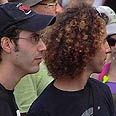
Soldier wounded in Shalit snatch speaks out
Two killed, Gilad kidnapped, but there was another soldier in tank who has refused to reveal himself until now. In rare conversation with Ynet during march, Roi Amitai shares his feelings. 'I care and it hurts that nothing is being done, but I don't want everything to be on my shoulders'
They were four – Lt. Hanan Barak, Staff Sgt. Pavel Slutzker, Cpl. Gilad Shalit, and Cpl. Roi Amitai – in a single incident that is still reverberating through the State of Israel. The first two were killed, and the third still hasn't come back after four years in captivity.
The fourth is the only one who has continued his life, wrapping himself in silence, refusing to expose himself. During the large-scale march for Gilad Shalit that arrived on Monday in Tel Aviv, Ynet got a hold of him for a rare conversation.
In the past years, Amitai has taken an active role in the Gilad release campaign, but, according to him, he has "acted behind the scenes." Even now he has a difficult time speaking about that day when he was injured by Hamas men who infiltrated into Israel via a tunnel dug under Kerem Shalom crossing. The incident has left him scarred and depressed. The wound, he knows, will not heal until the Shalit family's wound heals, too.

The Shalit rally coming through Tel Aviv on Monday (Photo: Tal Green)
In the hospital the day after the incident, Amitai spoke of his crew members, "Gilad, who has served with me since basic training, is a quiet, introverted, and modest guy. He has a smile that never comes off his face. Ever since he came to the group, he has changed and opened up."
He had a hard time believing that his good friend has been kidnapped by Hamas. "This doesn't fit Gilad; it doesn't fit anyone. But you have to know Gilad. If I could, I'd ask him, 'What the hell are you doing there.'"
Ever since that day, Amitai has refused to be interviewed. "I don't want it to fall on my shoulders," he explained on Monday. However, during the march, he agreed to share his sentiments. "It hurts, but it doesn't have a limit. I don't work with a 'pain speedometer.' As time goes on, it hurts. It's hard."
After his injuries healed, Amitai returned to military service. When he was released, he joined the Shalit release efforts. Then he traveled abroad to disconnect a little, to clear his head. While abroad, he heard that Hamas had issued a video clip of Shalit in captivity.
"When that video came out, you know, you get into it, and people around you don't understand that you are living a nightmare," he said.
In the past four years, Amitai has felt suffocated. Some people even pointed fingers at him, saying that he didn't do enough.
"There were reporters who said to me, listen, if you don't get up and do something right now, not only are you not contributing, it is damaging, destructive. Who are you to say this to me? I care, and it's hard for me to see these things, that four years have passed and people are pushing it aside, not doing anything. But I don’t want to put all this on my shoulders," he said.
Follow Ynetnews on Facebook










